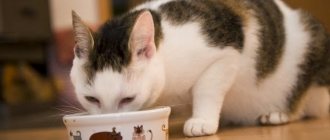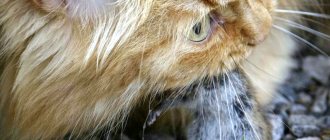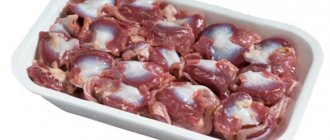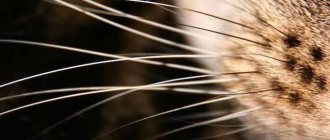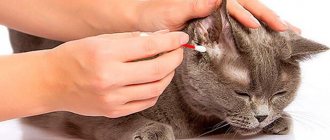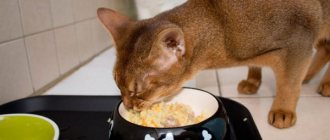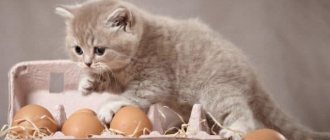Kefir product information
Kefir is a popular drink. The variety of kefir diets confirms its beneficial effect on the body.
Kefir is made by adding kefir starter to milk, which starts the fermentation process. This leads to the appearance of a complex product rich in beneficial microorganisms.
Kefir is in many ways similar to another product popular among dieters - yogurt. Kefir differs from its “relative” in that it contains more beneficial microorganisms and vitamins of groups A, D, K, E.
Kefir is popular among both people and cats
Kefir saturates the intestines with probiotics and creates favorable microflora. Its antibacterial properties prevent the development of pathogenic bacteria and diseases of the gastrointestinal tract.
Is kefir good for cats?
Kefir has a positive effect on the cat’s body, because it is rich in beneficial microelements and vitamins. For example, it contains calcium, which strengthens claws and bones, gives the coat a beautiful shine, and is also responsible for the functioning of the heart. Fluoride helps renew the blood, and iron is its important element, the deficiency of which provokes anemia.
A moderate amount of kefir in a cat's diet maintains a healthy appetite and helps intestinal function, and the vitamins it contains strengthen the immune system.
A little kefir never hurt anyone!
Kefir, despite its beneficial properties, is a capricious product when it comes to its presence in a cat’s diet. Too high a percentage of fat content will harm the cat’s stomach, because the digestive system of cats does not cope well with any fatty foods. In addition, the fresh drink contains a small percentage of alcohol. This is dangerous for the cat. To prevent alcohol from harming your cat, let the kefir sit for 2-3 days. During this time, the alcohol will disappear.
Side effects and contraindications
As cats get older, it is more difficult for them to digest dairy and fermented milk products. Their bodies quickly absorb lactose during the first two months of life, when mother's milk forms the basis of the daily diet. Such products, including kefir, are administered to adult cats with great caution. Lactose causes diarrhea in the animal, so take into account the individual characteristics of your cat and monitor his well-being. Kefir is not suitable for cats suffering from flatulence, as it causes gas formation. You should not feed it to easily excitable cats, because it can provoke aggression.
If the kitten has problems with stool, introduce kefir with caution.
Allergic reactions also occur. The allergy is manifested by skin itching and redness. This reaction is provoked by whole cow's milk, which is the basis of all fermented milk products. If you have previously noted these reactions of your animal to dairy products, it is better to avoid kefir.
Daily intake of kefir will lead to an excess of saturated fats, so you should include it in the menu no more than 2-3 times a week. And for older animals it is better not to administer it at all - poor lactose tolerance leads to disturbances in the functioning of the gastrointestinal tract.
Introduce kefir into your cat's menu carefully, while monitoring his well-being. Whether your kittens can include kefir in their diet will be determined by how they feel. If your friend's tummy becomes bloated or there are problems with bowel movements, remove kefir from the diet and consult a veterinarian.
If your cat feels bad from kefir, contact your veterinarian.
How to properly plan your pet's diet
It is better to entrust such a troublesome task to professionals and opt for high-quality ready-made cat food. In them, manufacturers monitor the balance of all components. Four-legged pets need not only meat rich in proteins, carbohydrates and fats on their menu, but also vegetables, vitamins and microelements.
If breeders prefer home-produced food, then you need to know some subtleties:
- Only dietary meat or offal can be given.
- Fish, such as halibut, must be cooked; You can pour boiling water over the chicken.
- It is not recommended to give pasteurized milk to small kittens. High lactose content will cause indigestion. But natural goat milk is very healthy.
- Cabbage, carrots, and pumpkin are desirable in the diet in raw form. But eggplants can lead to death.
- It is strictly forbidden to feed cats potatoes. The starch contained in the culture will lead to serious illnesses.
Monitoring your pet's diet is not at all difficult. Cats quickly get used to a certain menu and will happily eat the same foods. Fresh water must be constantly available.
Features of use
A cat that eats ready-made industrial food does not need additional products. Ready-made animal feed already contains a sufficient amount of calories and microelements, so there is no need to introduce kefir. The only appropriate addition to such a diet is clean water. The appearance of fermented milk products in the diet of a cat that is fed ready-made food will lead to kidney problems and urolithiasis.
You can diversify your pet’s menu with kefir if the animal’s diet is based on natural products. But do not forget about the proportional ratio of fermented milk products and meat products: there should be more meat. It is this that is the main source of energy and nutrients, and kefir cannot replace it. Kefir cannot replace water for your cat, although it quenches thirst well. If you decide to treat your pet to a drink, a bowl of clean water should be nearby.
Have you noticed that the kitten doesn’t like kefir? Don’t worry, an ordinary kitten will get along quite well without it at all; for him it is an optional product.
How to properly include kefir in a cat's menu
A cat can be fed kefir if its diet consists of natural products.
Have you decided to pamper your furry pet with kefir? The fat content of the drink should not exceed 3.5%. Kefir affects the intestines differently and has a complex composition, so give it to your cat a little two or three times a week. The animal’s stomach cannot cope with large portions, which will lead to poor health. Due to the high carbohydrate content, kefir for cats cannot definitely be called a dietary product. If your pet is prone to obesity, kefir may cause unwanted weight gain. And for kittens that do not gain weight well, kefir complementary foods will be useful. Cats do not know how to independently determine the amount of food they need, so the amount of kefir should be limited. To calculate the appropriate serving size for your cat, use the formula: one kilogram of animal weight = fifty milliliters of product.
Kefir will help your kitten gain weight
Different fermented milk products have different compositions. This means that you need to choose one specific product as complementary food. You cannot give kefir, sourdough and cottage cheese at the same time; a cat’s stomach cannot cope with the variety of bacteria.
Also, kefir and meat should not meet each other at the same time in the same bowl. Give your cat a drink a couple of hours before serving meat food. During this time, the kefir will have time to be absorbed by the stomach, and the cat’s appetite will awaken.
Benefits for weight loss
Ryazhenka can be used as one of the main products for fasting days. If you think that cleansing will not harm your body, then build your menu on small portions of vegetables and fish, and also add 3-5 glasses of fermented baked milk per day. Try to choose a drink with low fat content.
Personally, I prefer gradual weight loss, which is gentler on the body than intense fasting. Just drink a glass of sour milk as a snack, or instead of a heavy dinner. This will speed up metabolism, remove toxins, and the energy value of fermented baked milk will help satisfy hunger.
What kind of kefir can you give to a kitten?
When you choose a drink for your kitten, pay attention to only two important criteria - low fat content and freshness. Any store-bought kefir with these characteristics will do.
Before feeding your little friend purchased kefir, open it and leave it for a couple of days. Ethanol, which is harmful to the cat’s body, will evaporate in 1-2 days.
Treat your kitten to kefir no more than 2-3 times a week. It is better to offer the drink on a teaspoon: for a small kitten this portion will be suitable. In this case, the kefir must be at room temperature, otherwise the kitten will refuse to eat it.
Don't force feed your kitten. If he doesn't like kefir, find an equivalent substitute.
Is it necessary to salt the cat’s food, add seasonings to enhance the taste, or reheat the food?
To please the pet, the owner is ready to feed it even what a cat cannot be fed in principle: “Let him eat. She loves fish! My cat is smart and won’t eat anything that’s harmful.” The “fashion” for feeding cats fish arose for a simple reason - in most countries, fish is cheaper than meat. In nature, cats do not eat fish or seafood at all.
You can feed your cat fish, but not more than 1-2 times a week. The fish must be sea fish, without bones and entrails, and must be boiled (5 minutes in boiling water). It is not recommended to feed your cat fish that live in fresh water - the risk of infection with helminths is too high.
Many owners use the remains of their meals as food for cats - this should not be done under any circumstances. Our food is over-salted, over-spiced and overcooked. Cats should not eat fried, smoked, sausages or any canned vegetables or fruits - such food is harmful even to humans, and the body of pets is much more sensitive.
Mushrooms are a completely unnatural food for cats; their bodies do not have enzymes to break down mushrooms into their components (the cat cannot digest them). In addition, a cat can be seriously poisoned even by mushrooms that are edible to humans. It is extremely dangerous to offer your cat alcohol and coffee! There are known cases of cats dying after eating a small piece of lard, a pickled tomato, or a fried cutlet. Don't risk your pet's health!
We invite you to read: Instructions for use of the Stop Itching spray and suspension
No, no and NO. Food should be at room temperature or slightly higher, salt should not be added (the cat has enough of the salts contained in the food), and seasonings should be a direct cause of disorders and chronic diseases of the digestive tract.
Fresh and old kefir - is there a difference?
The properties of the drink depend on the number of days that have passed since its production. The beneficial bacteria that make up the product multiply at a high speed, so the effect of young and old kefir will be different.
Kefir, which is less than three days old from the moment of production, causes loose stools. Old kefir, whose shelf life is coming to an end, is strengthened. If your cat experiences constipation or, conversely, loose stools, kefir will help regulate the functioning of the gastrointestinal tract. Consider the general health of the animal. Do not give young kefir to a cat if it has a peptic ulcer, and old kefir is harmful if it has kidney problems.
Old kefir can be dangerous due to its high ethanol content. This substance can harm a cat's delicate stomach even in small doses, so it is better to choose a fresh product. In addition, a large number of microorganisms in kefir oxidize it over time. Cats usually don't like a sour taste.
Kefir can cause stomach upset
Kefir requires strict storage conditions. If the animal has not eaten all the kefir in the bowl, pour it out. A couple of hours is enough for the development of pathogenic microflora in kefir at room temperature.
Stages of the disease
Stage one. Initial.
At this stage, the symptoms of renal failure appear blurred and dim. The main place is occupied by the symptoms of the disease that caused PN.
Stage two. Oligoanuric.
Characterized by complete or partial cessation of urination. The animal is depressed, refuses food, and drinks large amounts of liquid.
The general body temperature may slightly increase by 0.5-1 degrees or be decreased.
Blood pressure is increased. Uremia develops, which is why the pet experiences vomiting, drowsiness, weakness, tachycardia, impaired inhalation and exhalation (shortness of breath), edema, anemia and general intoxication of the body.
Stage three. Restoration of diuresis.
Occurs in sick animals whose treatment was started in a timely manner. Urination is gradually restored, traces of blood are still visible in the urine, and the pet continues to feel weak and consume excess fluid.
Stage four. Recovery.
Complete recovery is observed 2-4 months after the start of treatment, after 2-3 weeks the symptomatic manifestation of the disease goes away.
Healthy dairy products
Fermented milk products are healthier for the cat's body than milk. They contain less lactose, and more calcium and bacteria beneficial for digestion. Therefore, we can safely feed our mustachioed friends:
- kefir It regulates intestinal function. Kefir with a high content of probiotics has a mild taste and is liked by cats;
- cottage cheese. It is rich in calcium, amino acids, and its nutritional value will serve as a good source of energy for the animal. To feed your cat, choose fresh cottage cheese with a low fat content;
- cheese. Most types are very fatty, so look for low-fat varieties. Calcium, which is abundant in cheese, is absorbed worse by the cat’s body than calcium from cottage cheese. Therefore, you should pamper your cat with cheese delicacies no more than once a week and in small portions. Adyghe cheese or feta cheese is suitable for kittens;
Sometimes you can indulge in cheese
- fermented baked milk and natural yoghurt. They will benefit the cat, but provided there are no additives. Yogurts with sugar, berries and flavor enhancers are contraindicated for animals.
But keep the sour cream for yourself. Despite the myth about cats' addiction to sour cream, the fat content of this product is too high for a cat's stomach. You can occasionally treat your cat with it only in diluted form. Glazed cheeses and curds with fruit fillings are also contraindicated.
But it’s better to abstain from sour cream
Veterinarian recommendations
Kefir is a complex product, but veterinarians agree that a moderate amount of kefir will have a beneficial effect on the cat’s body. Follow these recommendations, and your furry pet will be grateful for your care:
- kefir is useful in small quantities. Feed your pet no more than 2-3 times in seven days;
Do not leave kefir unattended, otherwise your cat may eat too much.
- Low fat kefir is best. Otherwise, side effects may occur;
- do not introduce kefir and other fermented milk drinks into the diet if your cat is fed factory food;
- kefir is dangerous for animals with peptic ulcers and problem kidneys;
- kefir does not combine with other sourdough-based products;
- animals do not digest synthetic additives and sweeteners well;
- For cats prone to excess weight, kefir can be harmful.
Guarantee of health
The gastrointestinal tract of animals is more sensitive than that of people, and they definitely need to choose a balanced diet, because the pet’s health, mood, and appearance depend on it. In specialized stores you can find a lot of healthy treats, nutritional supplements and complementary foods for cats, as well as balanced formulations. To choose the right food based on breed, age and health status, many turn to specialists for help.
As a rule, only dry food in a cat’s diet is quite enough. You can pamper your pet with canned cat food and other treats, but it is not advisable to give your cat natural products.
